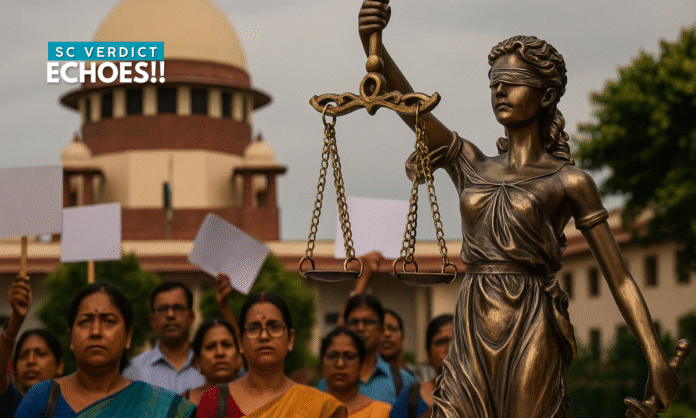SUMMARY
- Supreme Court allows “untainted” teachers to continue working despite cancelled 2016 SSC appointments.
- State ordered to begin fresh recruitment by May 31 and conclude the process by December 31.
- Nearly 26,000 jobs were scrapped after revelations of bribes, tampered OMRs, and political links in the SSC scam.
Bengal’s 2016 SSC Scam: Between Fraud and Fragile Futures
In a high-stakes judgment that could affect thousands of households across West Bengal, the Supreme Court has offered interim relief to a section of teachers whose jobs were axed earlier this month. In its latest ruling, the apex court said that teachers not involved in the recruitment scam—termed “untainted”—may continue in service until the state concludes a fresh recruitment process. That process, the court ordered, must begin by May 31 and be completed by December 31 this year.
This decision comes as a partial reprieve following the court’s earlier validation of a Calcutta High Court ruling that cancelled 25,753 teaching and non-teaching appointments. These appointments, made in 2016 through the West Bengal School Service Commission (WBSSC), were found to be mired in massive fraud, including manipulated OMR sheets, fake merit lists, and job-for-cash exchanges.
The Supreme Court’s intervention aims to balance justice with continuity in education, especially given that the cancellations had triggered protests, school disruptions, and a wave of uncertainty for both educators and students across the state.
এসএসসি মামলা নিয়ে সুপ্রিম কোর্টের ৬ নতুন নির্দেশ #SSC #Teacher #Recruitment #NewszNow pic.twitter.com/vDQ2UjpzmJ
— Newsz Now (@NowNewsz) April 19, 2025
The Scam That Shook Bengal: Bribes, Blank Sheets, and Betrayed Aspirants
- The 2016 recruitment drive by WBSSC saw widespread tampering of OMR sheets and fake rankings.
- Jobs were allegedly sold for bribes, sidelining deserving candidates.
- Political links emerged as TMC leaders were implicated, escalating public outrage.
The WBSSC scam isn’t just a tale of bureaucratic oversight—it’s a deep-rooted failure of integrity. Investigators uncovered blank answer sheets being marked and passed, cash-for-post rackets, and an entire shadow economy of job placements managed by middlemen and allegedly abetted by political figures.
What makes this more egregious is that meritorious candidates—those who scored well and waited years—were left out, replaced by those who paid their way in. This has deeply eroded trust in Bengal’s public recruitment systems, prompting calls for systemic reforms.
For the first time, the Supreme Court has clearly defined a category—“untainted” teachers—who did not engage in or benefit from the irregularities, offering them limited continuity but also making it clear their tenure is temporary.
Relief, But With a Deadline: What the SC’s Order Means for the State
- Teachers not linked to the scam can continue until the new selection is complete.
- West Bengal must start fresh recruitment by May 31, complete it by December 31.
- No blanket protection; final validity of current appointments depends on the new process.
The Supreme Court’s approach is measured—it does not reinstate all jobs, nor does it strip every educator of dignity. Instead, it provides a conditional extension, allowing schools to function and students to continue learning, while the state prepares a reformed and transparent recruitment mechanism.
The deadline puts significant pressure on the West Bengal government, already battling criticism for its handling of the case. Education experts warn that without transparency, robust IT systems, and third-party oversight, the fresh round of recruitment could again fall prey to political interference and malpractice.
Meanwhile, teachers relieved by the ruling remain in a limbo—they must prove their innocence and wait for the new process, while still performing their duties under public scrutiny.
The Political Heat: TMC in the Crosshairs, Opposition Smells Blood
- The scam has politically damaged the Trinamool Congress, especially Education Minister Bratya Basu.
- BJP, CPI(M), and Congress have all demanded resignations and CBI monitoring of the new recruitment.
- Protests by affected job seekers and sacked teachers continue outside government offices.
The Supreme Court ruling has intensified political friction in West Bengal. The ruling TMC, already under fire for other corruption allegations, has been accused of using public sector jobs as political currency. The BJP has launched a campaign branding TMC as the party of “scams and syndicates,” while the CPI(M) has accused the government of betraying the state’s educated youth.
With panchayat and general elections approaching, this issue is likely to dominate political discourse. The TMC’s credibility now rests on how efficiently and transparently it can execute the Supreme Court’s mandate and clean up the mess it is accused of creating.
From Scam to Systemic Reform: What Needs to Change?
The SSC scam exposed a larger systemic failure. It wasn’t just one batch, one year, or one official. It was a network of corruption that had become normalized. Experts and civil society now demand:
- Complete digitization of future recruitment and scoring systems.
- Independent ombudsman or third-party audit of the entire recruitment ecosystem.
- Public release of merit lists, OMR sheets, and appointment details for transparency.
- Criminal charges and swift convictions against the architects of the scam.
Unless these structural changes are made, repeating recruitment cycles will just mean repeating injustice. The Supreme Court has sent a message—justice cannot be delayed, but nor can it be denied to those who were honest in their aspirations.



